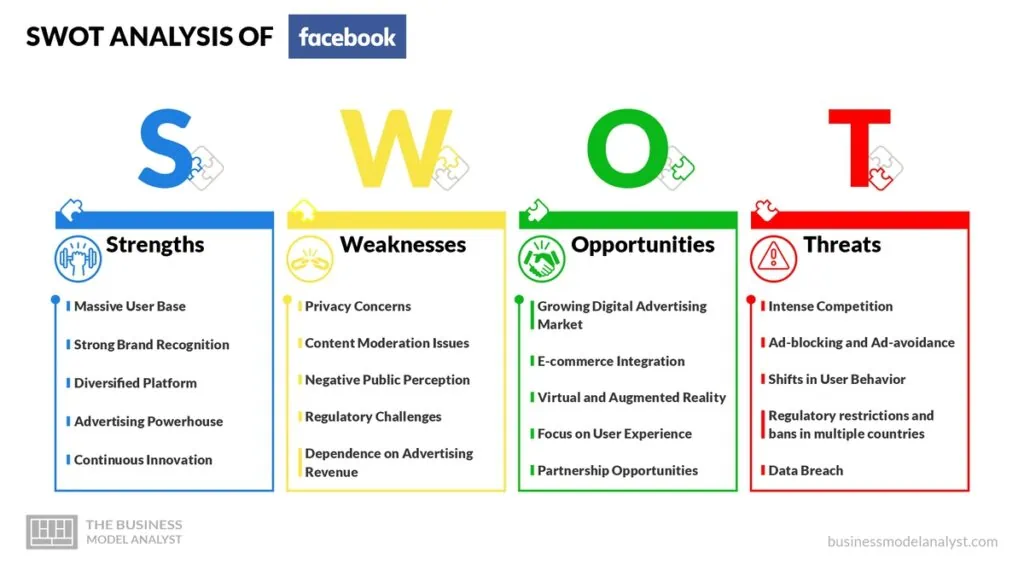A comprehensive exploration of the Facebook SWOT analysis will unravel the key factors that propel the technology giant’s success and the potential pitfalls it must navigate to maintain its dominance. Facebook is an online social media and social networking service that is owned and controlled by American technology giant, Meta Platforms. As the world’s largest social networking platform, Facebook has revolutionized how we communicate, share, and interact.
Facebook’s inception can be traced back to February 2004, when Mark Zuckerberg, along with his college roommates Eduardo Saverin, Andrew McCollum, Dustin Moskovitz, and Chris Hughes, launched a website called “Thefacebook” from their Harvard dormitory. Initially designed as an online platform to connect Harvard students, the website quickly gained popularity, leading to its expansion to other universities and colleges across the United States.
The rapid growth of “Thefacebook” caught the attention of venture capitalists, and in 2005, the company received its first major investment from Peter Thiel, co-founder of PayPal. This injection of funds allowed Zuckerberg and his team to expand their operations and rename the platform simply as “Facebook.” By the end of 2005, Facebook had amassed over 6 million registered users, cementing its status as the leading social networking platform among college students.
The turning point for Facebook came in 2006 when it opened its doors to the general public, making the platform accessible to anyone with a valid email address. This strategic move unleashed a tidal wave of growth, and within a year, Facebook’s user base skyrocketed to over 50 million people worldwide.
With its intuitive interface, user-friendly features, and an emphasis on connecting with friends and family, Facebook has tapped into a fundamental human desire for social interaction in the digital age. As Facebook continued to expand, it caught the attention of tech giants, and in 2007, Microsoft acquired a 1.6% stake in the company for $240 million, valuing Facebook at $15 billion. This significant investment validated Facebook’s potential and provided the necessary resources for further innovation and expansion.
In the subsequent years, Facebook solidified its position as the dominant force in social media. It introduced a range of groundbreaking features, including the “News Feed,” which allowed users to see real-time updates from their friends and connections, and “Like” buttons, enabling users to engage with content simply and interactively. These innovations, coupled with the widespread adoption of smartphones and the launch of the Facebook mobile app in 2009, propelled the company’s growth to unprecedented heights.
Facebook’s ascent continued with strategic acquisitions that expanded its influence and diversified its offerings. In 2012, Facebook acquired Instagram, a popular photo-sharing platform, for $1 billion, further solidifying its dominance in the mobile space. Two years later, in 2014, Facebook made its largest acquisition to date, acquiring the messaging app WhatsApp for a staggering $19 billion. These acquisitions not only expanded Facebook’s user base, but also allowed the company to tap into new demographics and emerging markets.
Today, Facebook boasts over 2.8 billion monthly active users, making it the largest social media platform in the world. Despite its remarkable success, Facebook has faced its fair share of controversies and challenges. Therefore, in this article, we will delve into a comprehensive SWOT analysis of this tech titan to uncover the strengths, weaknesses, opportunities, and threats that define its trajectory in an ever-evolving digital ecosystem.
Contents
SWOT Analysis of Facebook
Facebook Strengths
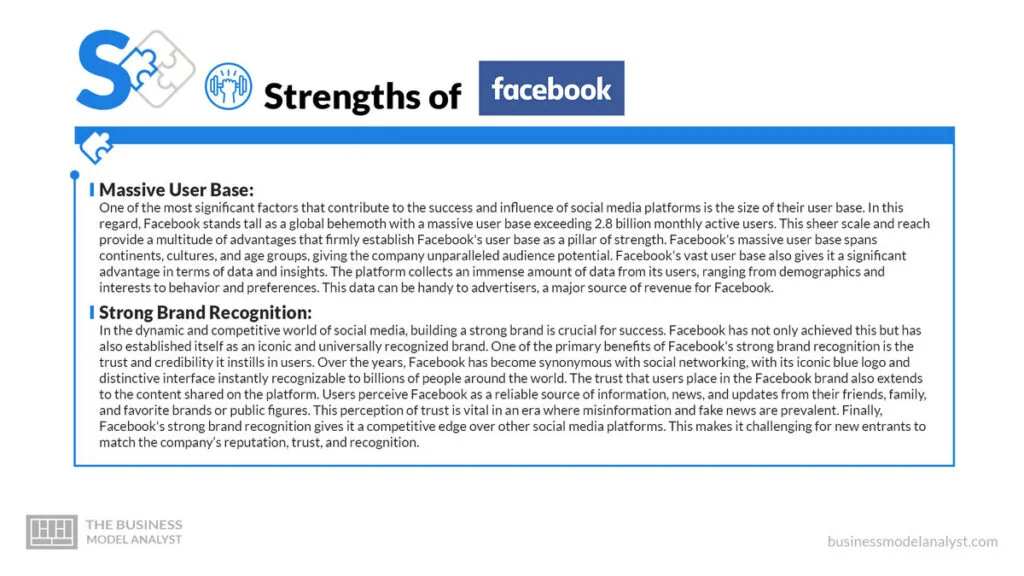
The following are the strengths of the largest social media platform in the world:
- Massive User Base
One of the most significant factors contributing to the success and influence of social media platforms is the size of their user base. In this regard, Facebook stands tall as a global behemoth with a massive user base exceeding 2.8 billion monthly active users. This sheer scale and reach provide a multitude of advantages that firmly establish Facebook’s user base as a pillar of strength
Facebook’s massive user base spans continents, cultures, and age groups, giving the company unparalleled audience potential. Facebook’s vast user base also gives it a significant advantage in terms of data and insights. The platform collects an immense amount of data from its users, ranging from demographics and interests to behavior and preferences. This data can be handy to advertisers, a major source of revenue for Facebook.
- Strong Brand Recognition
In the dynamic and competitive world of social media, building a strong brand is crucial for success. Facebook has not only achieved this but has also established itself as an iconic and universally recognized brand. One of the primary benefits of Facebook’s strong brand recognition is the trust and credibility it instills in users.
Over the years, Facebook has become synonymous with social networking, with its iconic blue logo and distinctive interface instantly recognizable to billions of people around the world. The trust that users place in the Facebook brand also extends to the content shared on the platform. Users perceive Facebook as a reliable source of information, news, and updates from their friends, family, and favorite brands or public figures.
This perception of trust is vital in an era where misinformation and fake news are prevalent. Finally, Facebook’s strong brand recognition gives it a competitive edge over other social media platforms. This makes it challenging for new entrants to match the company’s reputation, trust, and recognition.
- Diversified Platform
Facebook has expanded its offerings beyond its core platform, venturing into the acquisition of popular platforms such as Instagram and WhatsApp. This diversification has become a significant strength for Facebook, contributing to its dominance and success in the social media landscape.
One of the primary advantages of Facebook’s diverse platform is the ability to cater to different user preferences and demographics. Each platform within the Facebook ecosystem offers unique features and experiences, attracting a diverse range of users.
Additionally, the diverse platform provides opportunities for cross-platform integration and synergy. Facebook has strategically integrated features and functionalities across its platforms, allowing users to seamlessly connect and share content. This integration enhances the overall user experience and fosters deeper engagement within the Facebook ecosystem.
- Advertising Powerhouse
Advertising plays a vital role in revenue generation and market dominance. An essential aspect of Facebook’s strengths that stands out is its status as an advertising powerhouse. One of the key advantages of Facebook as an advertising powerhouse is its ability to provide highly targeted and personalized advertising options.
With Facebook’s massive database, businesses can create customized ad campaigns, tailoring their messaging to specific demographics or targeting users based on their interests and behaviors. Facebook’s advertising platform also offers a range of powerful tools and features that enable businesses to optimize their advertising efforts. The platform provides detailed analytics and performance metrics, allowing advertisers to measure the success of their campaigns, identify areas for improvement, and make data-driven decisions.
Finally, Facebook is an advertising powerhouse because of its extensive reach and global audience. With over 2.8 billion monthly active users, Facebook offers an unparalleled opportunity for businesses to connect with a vast and diverse audience.
- Continuous Innovation
In the fast-paced digital landscape, staying ahead of the curve and embracing innovation are crucial for the sustained success of any company. Facebook’s ability to constantly evolve and introduce new features, services, and technologies has been instrumental in solidifying its position as a leading social media platform. Facebook can adapt to changing user preferences and behaviors.
The company’s proactive approach to innovation ensures that it remains relevant and engaging to its vast user base. By introducing new features and functionalities, Facebook provides users with fresh experiences and keeps them actively engaged on the platform. This commitment to innovation also helps attract new users and retain existing ones, enhancing user satisfaction and loyalty.
In conclusion, Facebook’s culture of continuous innovation enables it to identify and capitalize on emerging trends and technologies. The company has a track record of acquiring promising startups and integrating their technologies into its platform.
Facebook Weaknesses
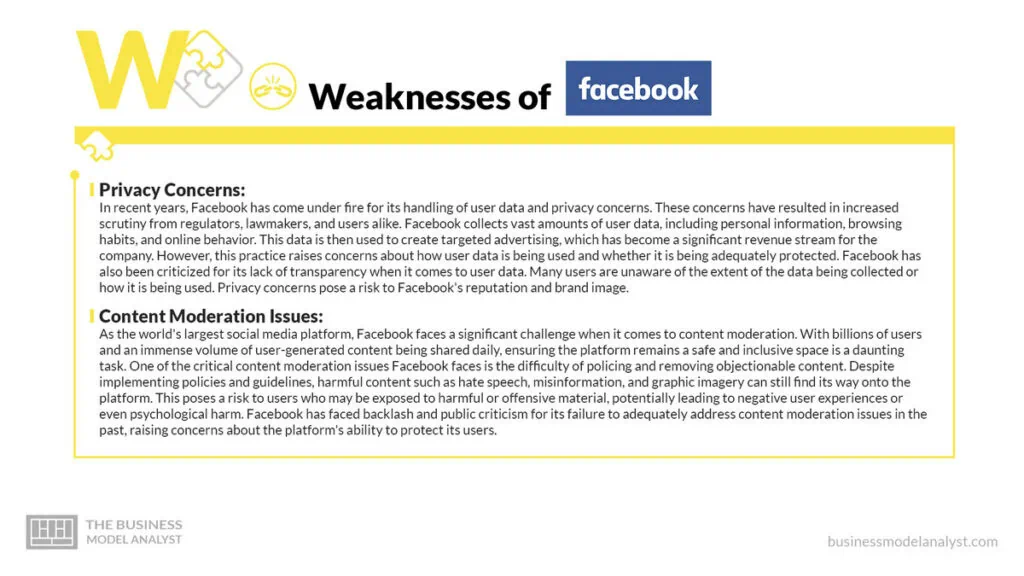
The following are the weaknesses that may cripple Facebook’s position as the leading social media platform in the world:
- Privacy Concerns
In recent years, Facebook has come under fire for its handling of user data and privacy concerns. These concerns have resulted in increased scrutiny from regulators, lawmakers, and users alike. Facebook collects vast amounts of user data, including personal information, browsing habits, and online behavior. This data is then used to create targeted advertising, which has become a significant revenue stream for the company.
However, this practice raises concerns about how user data is being used and whether it is being adequately protected. Facebook has also been criticized for its lack of transparency when it comes to user data. Many users need to be made aware of the extent of the data being collected or how it is being used. Privacy concerns pose a risk to Facebook’s reputation and brand image.
- Content Moderation Issues
As the world’s largest social media platform, Facebook faces a significant challenge when it comes to content moderation. With billions of users and an immense volume of user-generated content being shared daily, ensuring the platform remains a safe and inclusive space is a daunting task.
One of the critical content moderation issues Facebook faces is the difficulty of policing and removing objectionable content. Despite implementing policies and guidelines, harmful content such as hate speech, misinformation, and graphic imagery can still find its way onto the platform.
This poses a risk to users who may be exposed to harmful or offensive material, potentially leading to negative user experiences or even psychological harm. Facebook has faced backlash and public criticism for its failure to adequately address content moderation issues in the past, raising concerns about the platform’s ability to protect its users.
- Negative Public Perception
Facebook has had challenges managing its public image and reputation. The platform has been marred by controversies and negative headlines, resulting in a widespread negative public perception. One of the key factors contributing to the negative public perception of Facebook is the issue of privacy and data breaches.
Additionally, Facebook has been criticized for its handling of misinformation and fake news. The platform has been accused of facilitating the spread of false information, leading to real-world consequences. Negative public perception impacts Facebook’s ability to attract and retain users, particularly among younger demographics, who are more conscious of their online privacy and the societal impact of their digital presence.
- Regulatory Challenges
Facebook operates in a complex regulatory environment that poses significant challenges. One of the primary regulatory challenges Facebook faces is related to data privacy and protection. Governments around the world have been introducing stricter regulations to safeguard user data and hold tech companies accountable for their data practices.
The General Data Protection Regulation (GDPR) in Europe, the California Consumer Privacy Act (CCPA) in the United States, and similar legislations in other regions have placed stringent requirements on how companies collect, use, store, and protect user data. Also, regulatory challenges go beyond data privacy. Facebook faces scrutiny and regulation regarding its content moderation practices, political advertising, and the potential influence it wields over public opinion.
- Dependence on Advertising Revenue
Facebook’s business model centers around delivering targeted advertising to its vast user base. While this approach has proven highly lucrative, accounting for the majority of Facebook’s revenue, it also exposes the company to vulnerabilities and challenges. Firstly, the advertising industry is subject to fluctuations and changes in market conditions.
Economic downturns, shifts in consumer behavior, or changes in advertising trends can impact the demand for advertising and subsequently affect Facebook’s revenue stream. Moreover, the dependence on advertising revenue puts Facebook at the mercy of advertisers’ preferences and industry dynamics. In conclusion, reliance on advertising revenue can create a conflict of interest between user experience and revenue optimization.
Facebook Opportunities
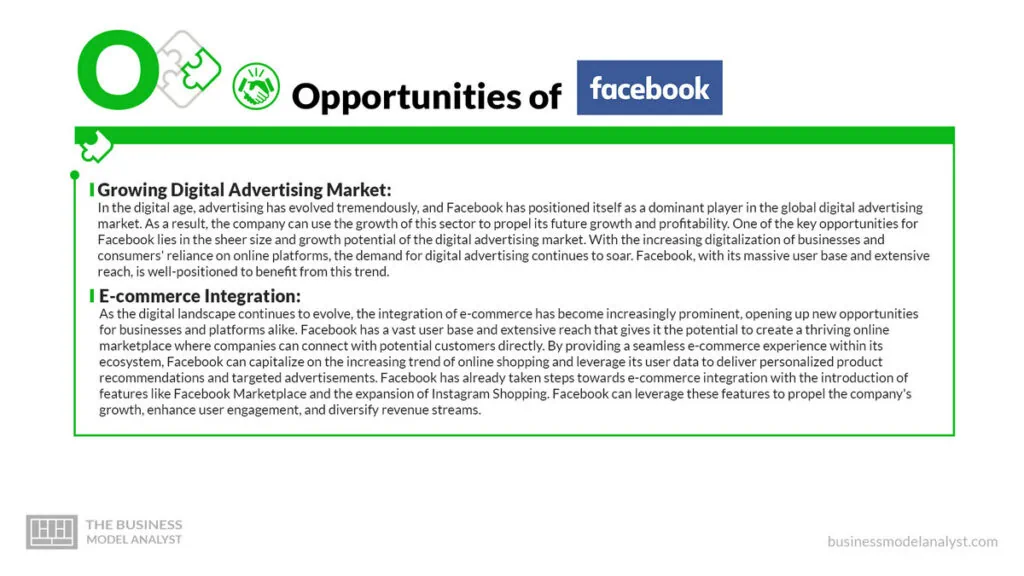
The following are the available opportunities that Facebook can exploit to remain the leading social media platform:
- Growing Digital Advertising Market
In the digital age, advertising has evolved tremendously, and Facebook has positioned itself as a dominant player in the global digital advertising market. As a result, the company can use the growth of this sector to propel its future growth and profitability.
One of the key opportunities for Facebook lies in the sheer size and growth potential of the digital advertising market. With the increasing digitalization of businesses and consumers’ reliance on online platforms, the demand for digital advertising continues to soar. Facebook, with its massive user base and extensive reach, is well-positioned to benefit from this trend.
- E-commerce Integration
As the digital landscape continues to evolve, the integration of e-commerce has become increasingly prominent, opening up new opportunities for businesses and platforms alike. Facebook has a vast user base and extensive reach that gives it the potential to create a thriving online marketplace where companies can connect with potential customers directly.
By providing a seamless e-commerce experience within its ecosystem, Facebook can capitalize on the increasing trend of online shopping and leverage its user data to deliver personalized product recommendations and targeted advertisements. Facebook has already taken steps towards e-commerce integration with the introduction of features like Facebook Marketplace and the expansion of Instagram Shopping. Facebook can leverage these features to propel the company’s growth, enhance user engagement, and diversify revenue streams.
- Virtual and Augmented Reality
Virtual reality (VR) and augmented reality (AR) have emerged as transformative innovations with the potential to reshape user experiences across various industries. As the parent company of Oculus VR, Facebook has made significant strides in the VR space, with the Oculus Rift and Oculus Quest headsets gaining popularity among consumers and developers alike.
The immersive nature of VR and AR technologies opens up exciting possibilities for enhanced social interactions, virtual travel experiences, gaming, education, and more. By leveraging its expertise and investment in VR and AR, Facebook can create compelling and immersive experiences within its platform. This integration has the potential to revolutionize how users interact with content, connect with others, and engage with brands.
- Focus on User Experience
User experience plays a pivotal role in determining the success and longevity of a platform. Focusing on user experience can drive Facebook’s growth, enhance its user satisfaction, and solidify its position as a leading social media platform.
With billions of active users worldwide, Facebook has the potential to create a seamless and engaging environment that keeps users coming back. By understanding and addressing user needs, preferences, and pain points, Facebook can build stronger user loyalty and attract new users. In conclusion, an improved user experience can also drive monetization opportunities for Facebook.
- Partnership Opportunities
Strategic partnerships can play a vital role in driving growth, expanding market reach, and unlocking new opportunities. While Facebook has already ventured into partnerships in various areas, more partnerships with established brands, technology firms, content creators, and industry leaders can open up new avenues for growth and diversification.
These partnerships can provide access to expertise, resources, and technologies that can strengthen Facebook’s existing offerings and create new value propositions for its users. In conclusion, strategic partnerships can enable Facebook to access new markets and enhance the company’s credibility and trustworthiness.
Facebook Threat
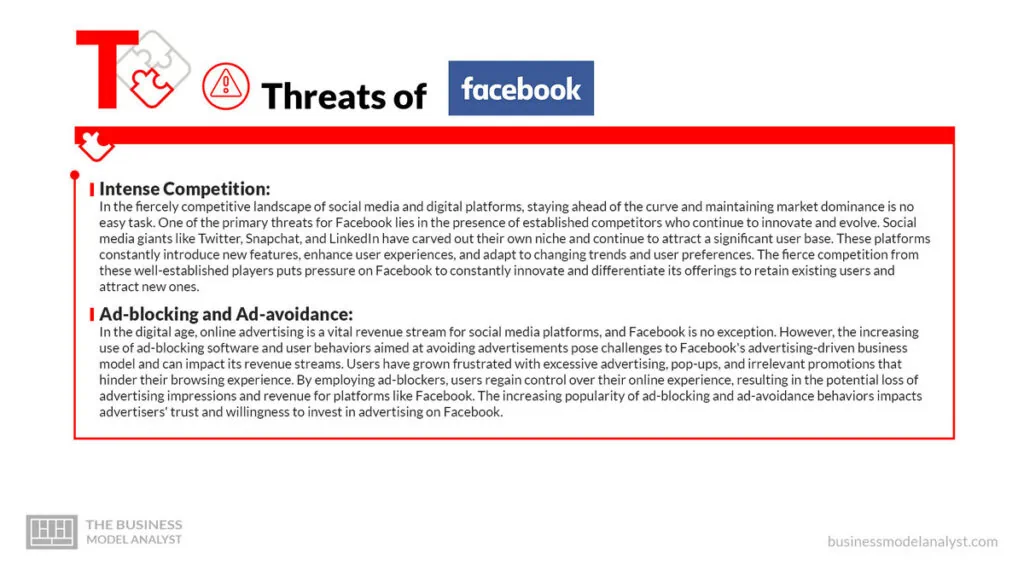
The following are the threats that may put the largest social media platform in the world at risk:
- Intense Competition
In the fiercely competitive landscape of social media and digital platforms, staying ahead of the curve and maintaining market dominance is no easy task. One of the primary threats for Facebook lies in the presence of established competitors who continue to innovate and evolve. Social media giants like Twitter, Snapchat, and LinkedIn have carved out their own niche and continue to attract a significant user base.
These platforms constantly introduce new features, enhance user experiences, and adapt to changing trends and user preferences. The fierce competition from these well-established players puts pressure on Facebook to constantly innovate and differentiate its offerings to retain existing users and attract new ones.
- Ad-blocking and Ad-avoidance
In the digital age, online advertising is a vital revenue stream for social media platforms, and Facebook is no exception. However, the increasing use of ad-blocking software and user behaviors aimed at avoiding advertisements pose challenges to Facebook’s advertising-driven business model and can impact its revenue streams.
Users have grown frustrated with excessive advertising, pop-ups, and irrelevant promotions that hinder their browsing experience. By employing ad-blockers, users regain control over their online experience, resulting in the potential loss of advertising impressions and revenue for platforms like Facebook. The increasing popularity of ad-blocking and ad-avoidance behaviors impacts advertisers’ trust and willingness to invest in advertising on Facebook.
- Shifts in User Behavior
User behavior is constantly changing, driven by advancements in technology, shifting societal trends, and emerging preferences. These erratic changes pose challenges to Facebook’s user engagement, relevance, and long-term sustainability. The increasing digital fatigue and information overload pose a threat to Facebook’s user engagement.
With an abundance of content available on various platforms, users may feel overwhelmed and opt to limit their time spent on social media. This shift in behavior impacts the overall user base and the potential for advertisers to reach and engage with their target audience effectively.
- Regulatory restrictions and bans in multiple countries
There is an increasing number of regulatory restrictions imposed by multiple countries against Facebook. Some countries have gone a step further by imposing bans or restrictions on Facebook’s services altogether. China, for instance, has maintained a ban on Facebook since 2009, limiting the platform’s access to the world’s largest online population.
Other countries like Iran and North Korea have implemented similar bans for political and ideological reasons. These restrictions severely limit Facebook’s reach and potential user base in these markets, impacting its global presence and growth opportunities.
- Data Breach
Facebook, as one of the world’s largest social media platforms, faces the ever-present risk of unauthorized access to user data, which can have severe consequences for its users, reputation, and long-term success.
One of the notable data breaches in Facebook’s history was the Cambridge Analytica scandal in 2018. It revealed that the personal data of millions of Facebook users had been harvested without their consent for political purposes. The incident highlighted the platform’s vulnerabilities and raised concerns about its ability to protect user data effectively.
Conclusion
With a massive user base, strong brand recognition, a diverse platform, an advertising powerhouse, and continuous innovation as its strengths, Facebook has established itself as a dominant force in the digital realm.
However, it also faces challenges and threats, including privacy concerns, content moderation issues, negative public perception, regulatory challenges, and dependence on advertising revenue. Recognizing these weaknesses and threats is crucial for Facebook to address them effectively and maintain its competitive edge.


